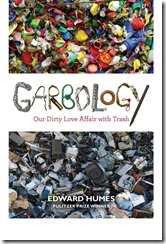Edward Humes is a California-based, Pulitzer Prize-winning journalist who has turned his attention to the stuff we throw away. "Garbology: Our Dirty Love Affair With Trash" ($27 in hardcover from Avery/Penguin; e-book versions for the Amazon Kindle and Barnes and Noble Nook) is a fascinating and surprisingly upbeat look at how we got here, where trash goes when it's tossed, and how ordinary mortals can make a difference.
Where's "here"? Humes sums it up: "Americans make more trash than anyone else on the planet,throwing away about 7.1 pounds per person per day, 365 days a year. Across a lifetime that rate means, on average, we are each on track to generate 102 tons of trash."
What's more, "American's two highest volume exports to China were paper waste and scrap metal, a little more than $8 billion worth of bundled old newspapers, crushed cardboard, rusty steel and mashed beverage cans sold at rock-bottom prices. ... America, a country that once built things for the rest of the world, has transformed itself into China's trash compactor."
Humes is scheduled to be interviewed by Nancy Wiegman on Nancy's Bookshelf this Friday morning at 10:00 a.m. on KCHO (Northstate Public Radio, 91.7 FM).
Humes' research is driven by a key question: "How is it possible for people to create so much waste without intending to do so, or even realizing they are doing it?" He spends time at Southern California's Puente Hills landfill (the "largest active municipal dump in the country"), charts the history of Waste Management, Inc., and details the work of trash-trackers (who attach electronic beacons to thrown-out sneakers and plastic containers). "Managing waste" makes it seem to disappear. But it's still there, such as in the zillions of plastic nodules mixed into our beaches and populating the "Great Pacific Garbage Patch."
Humes devotes a chapter to Andy Keller, the head of ChicoBag, and Keller's legal fight with "Big Plastic." Plastic grocery bags "are mostly not recycled despite decades of efforts. ... Their environmental footprint and cost are greater than the simple expedient of a reusable bag. They are, as Andy Keller is quick to point out, a product with a useful life measured in hours and a waste life measured in centuries."
Now we know.



